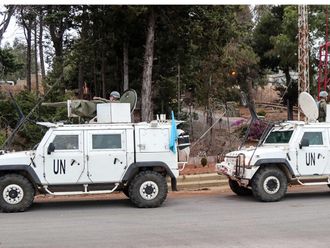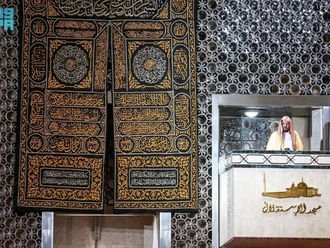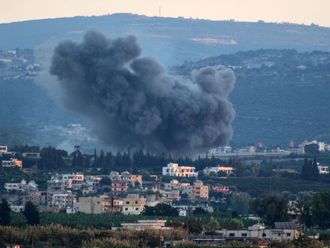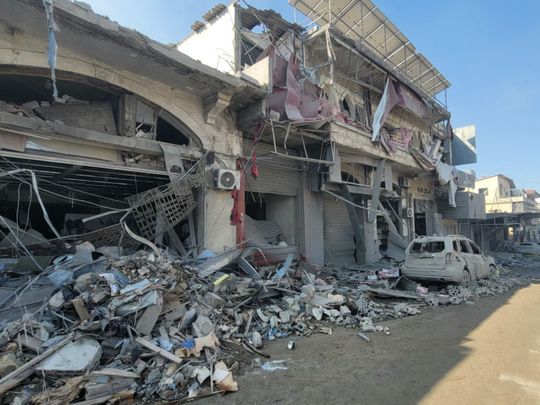
NABATIEH: Rubble and plumes of smoke were all that was left Sunday of Nabatiyeh marketplace, once the beating heart of the city in south Lebanon where Israel has intensified its bombardment.
Late Saturday, state media reported Israeli air strikes on the marketplace of the major city some dozen kilometres from the border with Israel.
The health ministry said the attack wounded eight people. Israel’s military has not commented.
“It’s as if an earthquake shook the Nabatiyeh market. It’s been completely destroyed,” said resident Tarek Sadaka.
“Even the street corner where we used to sit and drink coffee in the morning was destroyed.”
Also read
- UN warns against 'catastrophic' regional conflict as Israel urges evacuations in Lebanon and Gaza
- Israel wants UNIFIL to move from harm’s way in Lebanon: What is UNIFIL? When was it created and Why?
- Israeli strike 'completely' destroys mosque in Lebanon
- Israel widens Lebanon strikes as troops fight Hezbollah along border
The air strike badly damaged the buzzing market, which was home to shops selling everything from clothing and jewellery to sweets, as well as to small restaurants.
“Words can’t express what I feel,” Sadaka said, holding back the tears.
“I’m staying here and I will not leave Nabatiyeh - Nabatiyeh is our motherland. It’s heartbreaking to see people’s livelihoods gone,” he said.
A few metres (yards) away, flames still licked at chipped masonry on Sunday as black smoke rose from the ruins.
Electrical wiring hung from the shattered facade of a three-storey building, its walls blackened.
A bulldozer worked to clear scattered debris which had blocked the streets.
Just one tree remained standing, unscathed, amid the widespread destruction.
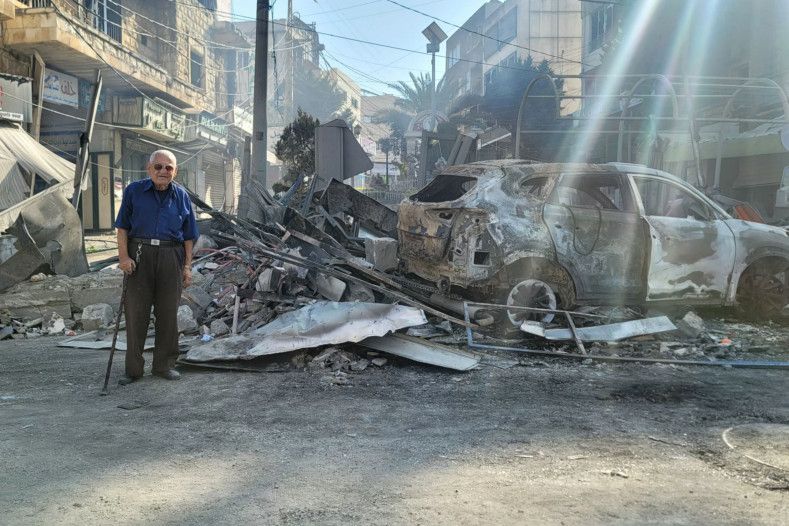
‘Scorched earth’
Nearly a year of cross-border exchanges between Israel and Hezbollah over the Gaza war escalated into all-out conflict on September 23.
Since then, Israel’s intense military campaign of bombardment has killed more than 1,260 people in Lebanon, according to an AFP tally of official figures.
It has also displaced upwards of one million people, Lebanese officials said.
Since last October, Israel has launched limited strikes on Nabatiyeh, but the damage was nothing compared with the destruction caused by the air strikes.
Nabatiyeh is home to major public institutions, public and private hospitals and several universities.
Helmi Jaber slowly made his way around the dilapidated market on Sunday, walking with a cane.
The elderly man said he lived nearby but his room was flooded when a water tank leaked after being damaged in the strike.
“This was the most beautiful area and the best market” in the city, Jaber said.
“We are scared... We fear there may be new strikes. They (the Israelis) do not spare anyone and want to turn Nabatiyeh into scorched earth,” he added.
He said he wanted to leave, “but who will take me in now? I can barely move” he said, squeezing his cane.
“Who will look after us? Lawmakers who can afford to travel and stay in hotels? Will any of them check on us?” he asked of a country reeling from five years of economic crisis widely blamed on a corrupt governing elite.
‘Nabatiyeh is my soul’
Every day for years, Mahmoud Kharabzeit, 69, would have coffee with his friends at the marketplace.
He said he was in shock after this fixture in his life disappeared in the blink of an eye - but he also insisted that the city would overcome the destruction.
Nabatiyeh “has been through many wars - it has been bombed, but we are still standing our ground”, he said.
“I will stay here. My home is here, my family house is here, and that of my siblings,” Kharabzeit said.
“I cannot leave Nabatiyeh. Nabatiyeh is my soul.”
Ali Taha, a 63-year-old local imam, felt the loss of the market keenly.
“It’s as if my home has been bombed. This is where we grew up and where everyone got to know each other,” he told AFP.
In the streets on Sunday and in social media posts, residents and others originally from the city expressed their grief at the loss of Nabatiyeh’s iconic market.
Writer Badia Fahs listed the shops and their owners in a Facebook post ... a bookstore, a shop selling sweets, a clothing and shoe store, a falafel and spice shop - and a music store filling the streets with Arabic melodies...
“It is our heart that has been burnt, not just a square made of cement,” she wrote.


